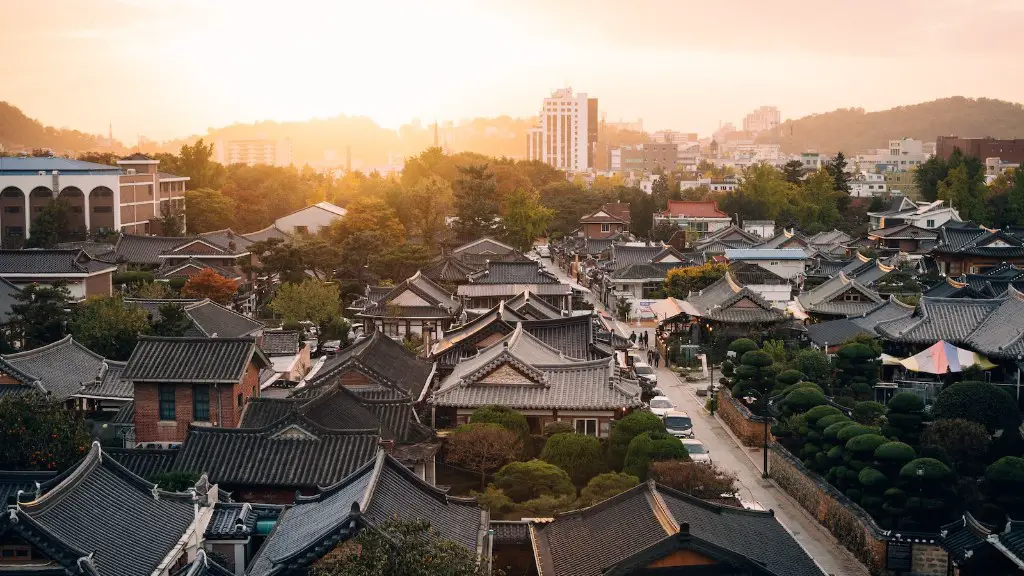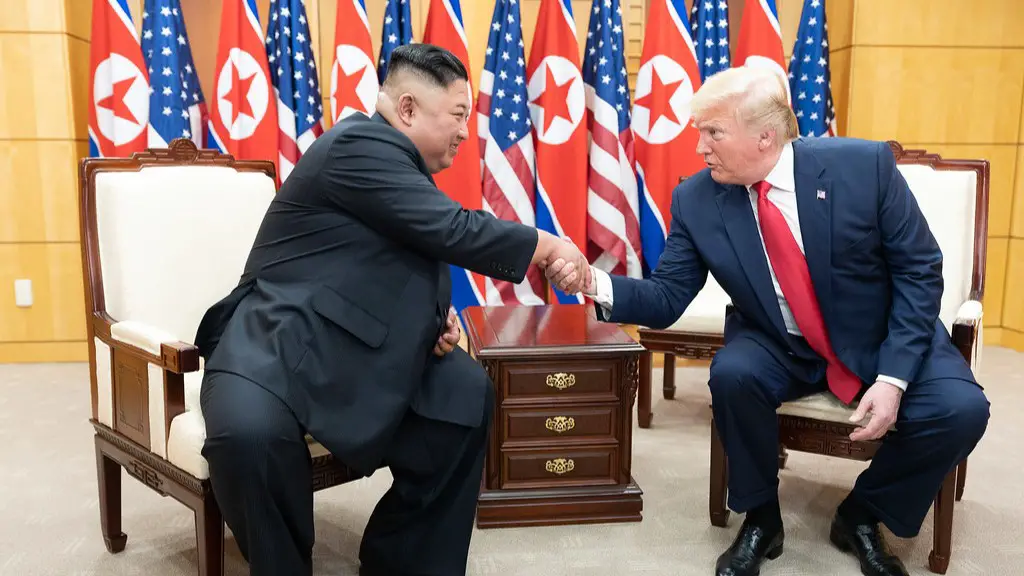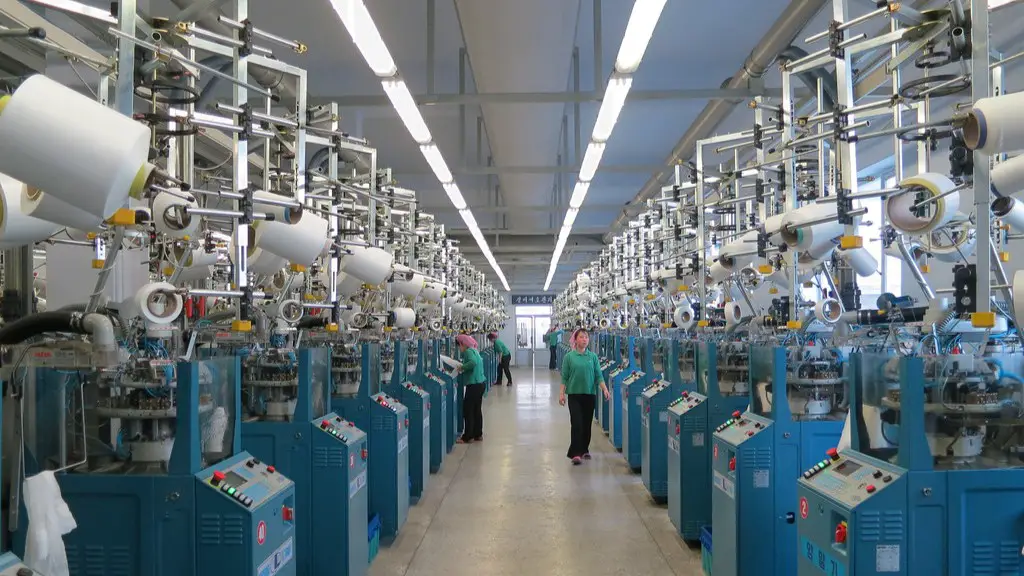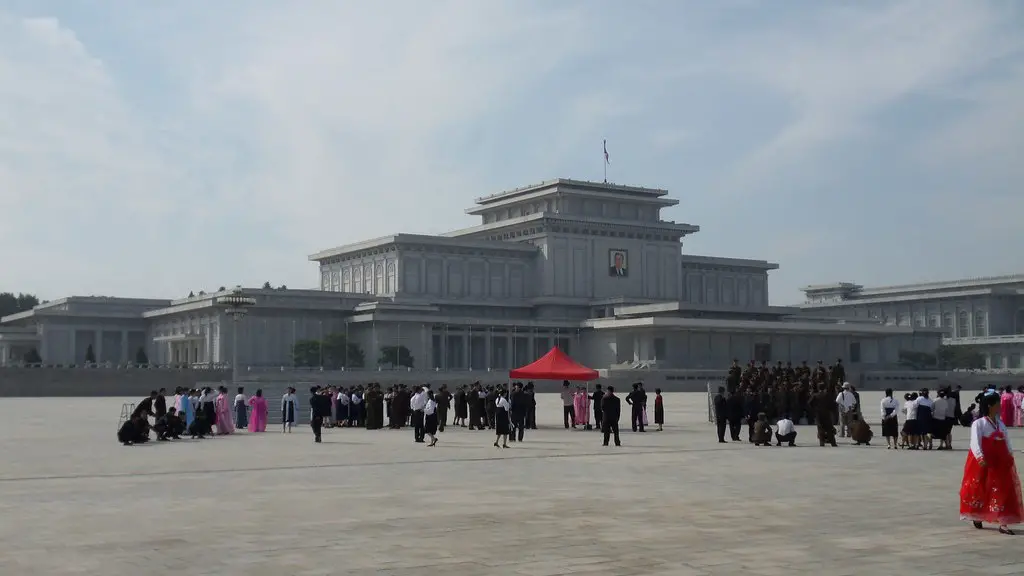North Korea is a hermit kingdom that has mystified the world since its creation in the late 1940s. The nation’s origin story has been shrouded in mystery and intrigue, leading many to wonder: when exactly did North Korea come into existence?
Korea had enjoyed a centuries-long period of relative peace and stability prior to the advent of World War II. In 1910, the peninsula was annexed by Japan and ruled as a colony of the Japanese empire for the next 35 years. Japan’s occupation was oppressive and exploitative, resulting in significant hardship for the Korean people. Finally, after five long years of combat, the Allied forces emerged victorious and liberated Korea from its Japanese overlords. This marked the beginning of North Korea as a distinct nation with its own political agenda.
On August 15, 1945, Soviet administrators declared the establishment of the “Korean People’s Republic,” a provisional government located in the northern half of the Korean peninsula. This proto-state was heavily influenced by the political ideology of communism, due in large part to the Soviet’s pervasive ideological presence in the region. Three years later in 1948, the Democratic People’s Republic of Korea (aka North Korea) was officially born. Its founder, Kim Il-sung, became the nation’s first leader. As a dedicated disciple of Joseph Stalin, Kim Il-sung quickly began transforming North Korea into a self-proclaimed “socialist paradise.”
In the decades that followed, North Korea built a complex and formidable political system designed to protect its citizens from the influence of the “evil” capitalist West. The nation’s isolationist mentality created an atmosphere of xenophobia and paranoia that can still be felt today. By the late 1980s, North Korea had become an autocratic state ruled by Kim Il-sung as a leader for life. His son, Kim Jong-il, assumed power after his father’s passing in 1994 and proceeded to implement a multi-generational dictatorship still in place today.
North Korea’s secluded political atmosphere has naturally made it a source of global interest and intrigue. In recent decades, the nation’s foreign policy has raised eyebrows as it continues to build a formidable military arsenal and actively engage in international conflict. In spite of heavy sanctions and criticism from the international community, North Korea continues to remain a powerful and defiant player in geopolitics.
North Korea has certainly come a long way since its inception in 1948. Its incredible resilience in the face of global adversity has made it an object of fascination for many observers around the world. In spite of its myriad of issues, the nation is an undeniable success story of a people that has fought hard and persevered to create a nation that is deeply committed to its ideals and traditions.
North Korean Politics
North Korea’s political system is one of the most tightly controlled in the world. The Communist-style government is led by the Kim family and their inner circle of loyalists from the Central Committee of the Workers Party of Korea. This organization has the ultimate say in all decision-making processes were it comes to the nation’s laws, policies and ideology. Central government decisions are put into effect with an iron fist and enforced by an extensive military and security apparatus. The country’s media and education system are both rigorously managed and tightly censored, eliminating all forms of opposition to the regime.
The Central Committee also controls economic policy and development, largely through the use of strict isolationist and protectionist measures. This economy-by-command has resulted in years of deprivation, poverty and inequality for the vast majority of North Koreans. Although the nation is rich in resources, the government’s manipulation of the market makes it almost impossible for citizens to get ahead and improve their living conditions. Unfortunately, the authoritarian nature of North Korea has severely limited the nation’s potential for growth and development.
North Korea is also well-known for its confrontational stance towards the international community and its support of international terrorism. The nation has a history of engaging in aggressive confrontation with its neighbors and actively proliferating illegal weapons. This has led to various UN sanctions and punitive measures, which have done little to modify the regime’s behavior. In recent years, North Korea has also stepped up its nuclear weapons program, leading to heightened diplomatic tension between the nation and its rivals.
North Korea’s unorthodox political system has created a series of unique challenges for the nation – both internally and externally. Internally, the repressive nature of the political elites has created an atmosphere of fear and mistrust. This has caused a lack of faith in institutions and the rule of law, creating an insecure environment for citizens. Externally, the country’s isolationist stance and provocative foreign policy have led to significant international isolation and hostility from the global community.
North Korean Relations with the World
In spite of its aggressive international posturing, North Korea has made efforts to cultivate diplomatic ties with the wider international community. This surprising approach to foreign affairs has been relatively successful, despite the fact that domestic politics remain heavily controlled by the regime. The nation has made some progress towards developing trade and cultural exchanges with other countries, although much work remains to be done.
Generally, North Korea is on friendly terms with other authoritarian countries in the region. Its ties with Russia and China are particularly strong, as these countries have maintained extensive economic and military relationships since North Korea’s creation in 1948. This cooperation has been instrumental to maintaining North Korea’s sovereignty and defiance against Western capitalism.
North Korea’s relations with the US have also been noteworthy in recent years. Although tensions between the two nations remain high, diplomatic efforts have resulted in some incremental improvements. This has culminated in a historic summit between US President Donald Trump and North Korean leader Kim Jong-un in 2018. It is yet to be seen what kind of further progress can be made towards regional cooperation.
North Korea’s international relations remain a source of strategic importance for the region. As one of the most isolated nations in the world, its conduct is treated as a sign of how much progress it can make in terms of inclusion and cooperation with the rest of the world. At the moment, the hopes for the nation’s full integration remain largely speculative. Nonetheless, North Korea’s presence in the global arena remains to be one of the most talked about topics in contemporary geopolitical discourse.
North Korean Human Rights
North Korea has received sharp criticism over its dismal human rights record. Under the current leadership, basic political freedoms and civil liberties of the country’s citizens have been severely restricted. The government has long engaged in various forms of suppression, such as harsh labor camps, revenge killings and public executions.
Moreover, the nation’s lack of access to clean water has caused severe health problems, especially among the country’s most vulnerable populations. The nation is largely cut off from the global community and its people are subjected to extreme economic deprivation. Furthermore, North Korea is known to actively imprison and torture individuals suspected of opposing the government.
The United Nations has repeatedly expressed its concerns about North Korea’s atrocious human rights record. In addition, international figures have repeatedly called on the Kim regime to reform its policies and bring its citizens greater freedoms. Despite the global pressure, North Korea has yet to make significant progress in the area of human rights.
The lack of human rights in North Korea can be attributed to the lax implementation of the rule of law. The majority of the nation’s laws and regulations are loosely enforced and violations of any data are rarely punished. This has resulted in a system of impunity and widespread corruption, making it virtually impossible for citizens to receive any kind of justice.
Ultimately, the resolution of North Korea’s human rights crisis must involve a complete overhaul of the nation’s legal system and a commitment to the engagement of international bodies and watchdogs. Until these changes are made, the nation’s citizens will remain under the oppressive yoke of their rulers.
North Korean Culture and Society
Although the nation is broadly known and recognized as an isolated and repressive state, the North Korean people are much more than that. The nation’s culture and society encompasses many different aspects of day-to-day life and the values of its citizens. North Koreans have a distinctly patriotic character, displaying immense pride for their nation and its achievements.
The North Korean people are known for their adherence to Confucian principles, such as respect for elders, devotion to family and emphasis on filial piety. In addition, the nation’s traditional practice of ancestor worship is also deeply entrenched in its culture. In spite of its political suppression, North Korea remains an example of a nation with a strong sense of identity and belonging.
North Korean culture is also reflected in its literature, art and music. In particular, the nation’s music has been highly praised for its inspiring and uplifting qualities. In spite of its limited production and distribution, North Korean music has had considerable influence in the wider region, exporting a proud and patriotic sentiment to international audiences.
Finally, North Korea’s education system is widely considered to be one of the best in the world. The nation has achieved education widely, with near-100% literacy rate among adults. This education system is heavily focused on ideological indoctrination, with the Kim family and the ruling ideology of Juche at the center of its discourse. Nonetheless, it has provided a sense of stability and progress to many North Koreans, helping the nation to survive the challenges of pervasive poverty and international isolation.
North Korean Food Cuisine
North Korean cuisine is one of the nation’s most defining features, providing a unique and flavorful experience to its citizens and visitors alike. The nation’s culinary traditions are closely intertwined with its cultural heritage, incorporating elements of traditional Korean, Chinese and Japanese cuisine. It is also heavily influenced by the nation’s rich agricultural production, with a focus on rice, vegetables, mushrooms and seafood.
North Korean food is traditionally served in a family-style dinner, with the main dish at the center of the table. Dishes are typically accompanied by kimchi, a traditional side dish made from fermented cabbage. Traditional soups, noodles and dumplings are also popular staples. North Koreans usually enjoy meals in the company of family and friends, emphasizing the importance of communal gatherings.
In spite of the many challenges the nation faces, North Korean food is highly celebrated around the globe. Food tourists flock to the nation in order to get a taste of the authentic cuisine. International interpretations of North Korean dishes have also gained popularity in recent years, with the toppoki, dalkgalbi and hwajeon becoming popular dishes in Korean-American restaurants.
In conclusion, North Korean food is a source of national pride, offering a unique insight into the nation’s rich culinary culture. It has become a symbol of cultural identity in the region, and a powerful representation of the nation’s strength and resilience.





